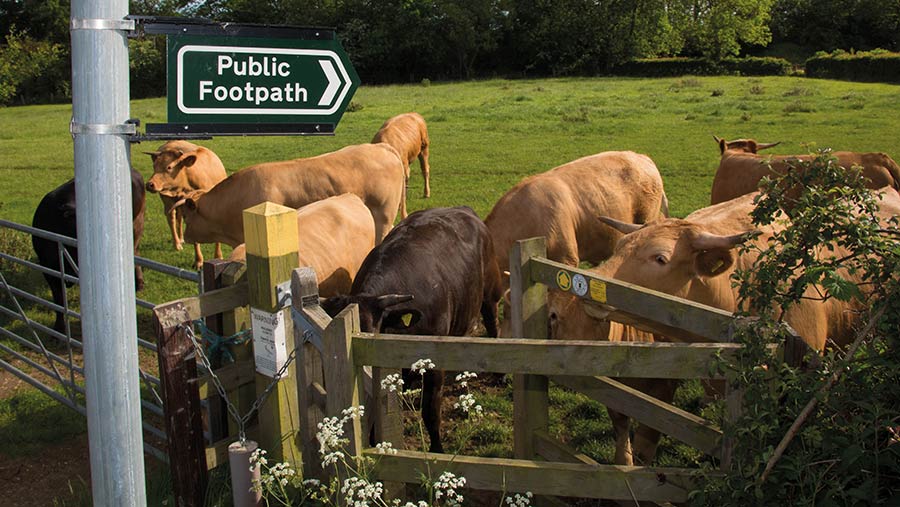Business Clinic: Cattle and public access – reducing risk
 © Tim Scrivener
© Tim Scrivener Whether you have a legal, tax, insurance, management or land issue, Farmers Weekly’s Business Clinic experts can help.
Here, Freddie Braithwaite-Exley, of A-Plan Rural Insurance, advises on how to reduce the risk when the public and cattle share the same space.
See also: Business Clinic: what to consider with business interruption cover
Q. There have been recent reports in the farming press about prosecutions following cattle and the public coming into contact, sometimes with tragic results.
We have a mixed arable and livestock farm with a number of footpaths going over our land. It’s inevitable that my cattle will be in the same fields as members of the public using the footpaths.
How can I reduce risk and what insurance do I need to have in place?
A. This is a common problem for farms and businesses of all sizes, and that’s not surprising when you consider there are 140,000 miles of public rights of way in England and Wales and a “right to roam” across Scotland.
When you add in the growing popularity of country walks following the pandemic, and a rise in the number of new dog owners, there is an increased risk to livestock from members of the public who are not used to the countryside and not aware of the Countryside Code.
In insurance terms, farmers are liable for the actions of their livestock. They also owe a duty of care to those on their land.
These two factors mean farmers can be held responsible should a member of the public suffer injury on your property.
The Health & Safety Executive (HSE) regularly investigates incidents involving cattle and members of the public, almost all of them in fields and enclosed areas.
The two most common factors are cows with calves and walkers with dogs.
The general public may not understand that cattle with calves can present a risk due to protective maternal instincts.
Aside from the severe injury that worrying can cause to stock, significant property damage can be caused by livestock running into fences in attempts to escape a dog attack .
Can I prevent the public crossing my land?
The Countryside and Rights of Way Act 2000 gives the public the right to walk on mapped access land, which includes mountain, moor, heath, down and registered common land.
They do not have the right to access private land that doesn’t fall under this legislation; however this doesn’t always stop the public.
In Scotland the Land Reform Act 2003 gives anyone rights of access over land throughout Scotland, provided they behave responsibly and subject to specific exclusions set out in the Act.
We believe it is best to work with the public and help them access the land responsibility and safely:
- Put up clear signage to warn of the dangers and provide advice. For instance: “Bull in field” and “Keep all dogs on leads”.
- Signpost paths to help people keep to them
Take steps to lower risk. These include:
- Considering the level of potential public exposure when grazing your livestock – some fields may not be suitable for heifers and their calves or bulls.
- Fitting gates or other means of closure at field entry points – preferably spring-loaded – that are at least of equal height to the perimeter fencing.
- Checking cattle regularly for illness or injuries that could become causes of aggression.
- Taking extra precautions for bulls. Some recognised dairy breeds are banned from being in fields crossed by public rights of way.
Insurance
It is your responsibility to ensure that safety of anyone on your land, legally or otherwise.
Having the correct level of public liability cover is vital.
Typically, farm insurance policies now cover public liability to a limit of £10m – we strongly recommend this as a minimum to fully protect your interests.
Rights of way disputes can be expensive, so consider legal expenses cover. This can include access to a free legal advice helpline.
Do you have a question for the panel?
Outline your legal, tax, finance, insurance or farm management question in no more than 350 words and Farmers Weekly will put it to a member of the panel. Please give as much information as possible.
Email your question to [email protected] using the subject line “Business Clinic”.
